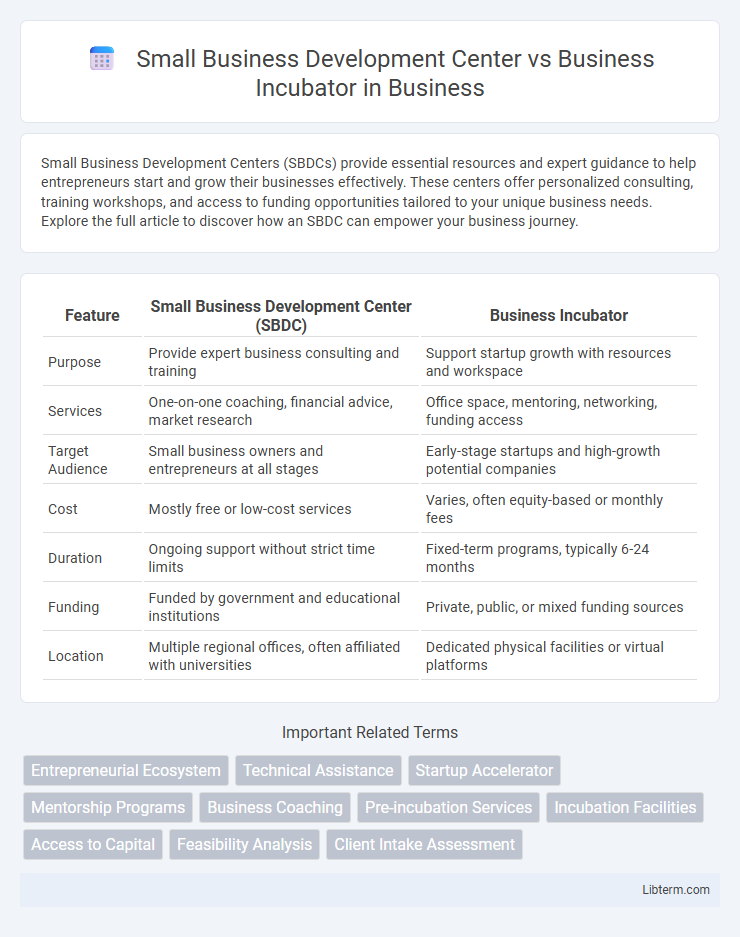Small Business Development Centers (SBDCs) provide essential resources and expert guidance to help entrepreneurs start and grow their businesses effectively. These centers offer personalized consulting, training workshops, and access to funding opportunities tailored to your unique business needs. Explore the full article to discover how an SBDC can empower your business journey.
Table of Comparison
| Feature | Small Business Development Center (SBDC) | Business Incubator |
|---|---|---|
| Purpose | Provide expert business consulting and training | Support startup growth with resources and workspace |
| Services | One-on-one coaching, financial advice, market research | Office space, mentoring, networking, funding access |
| Target Audience | Small business owners and entrepreneurs at all stages | Early-stage startups and high-growth potential companies |
| Cost | Mostly free or low-cost services | Varies, often equity-based or monthly fees |
| Duration | Ongoing support without strict time limits | Fixed-term programs, typically 6-24 months |
| Funding | Funded by government and educational institutions | Private, public, or mixed funding sources |
| Location | Multiple regional offices, often affiliated with universities | Dedicated physical facilities or virtual platforms |
Overview: Small Business Development Centers vs Business Incubators
Small Business Development Centers (SBDCs) provide comprehensive consulting, training, and resources to help entrepreneurs start, manage, and grow small businesses through expert guidance, market research, and financial planning. Business Incubators focus on nurturing early-stage startups by offering physical workspace, mentorship, access to investors, and business services aimed at accelerating growth and innovation. While SBDCs emphasize advisory support and education for small businesses at various stages, business incubators prioritize creating an innovative environment to rapidly scale high-potential startups.
Core Mission and Objectives
Small Business Development Centers (SBDCs) primarily focus on providing comprehensive business consulting, training, and access to financing to help small businesses start, grow, and succeed. Business Incubators concentrate on nurturing early-stage startups by offering workspace, mentorship, and resources to accelerate growth and innovation. While SBDCs emphasize advisory services and market readiness, incubators prioritize hands-on support and fostering entrepreneurial ecosystems.
Types of Services Provided
Small Business Development Centers (SBDCs) offer comprehensive services such as business plan development, financial analysis, marketing strategies, and one-on-one consulting tailored for small businesses and startups. Business Incubators primarily focus on providing physical workspace, mentoring, networking opportunities, and access to investors to accelerate the growth of early-stage companies. While SBDCs emphasize education and advisory support, incubators create a collaborative environment designed to foster innovation and business scalability.
Target Audience and Client Profiles
Small Business Development Centers (SBDCs) target early-stage entrepreneurs and small business owners seeking guidance on business planning, financing, and growth strategies, typically serving startups and established small businesses across various industries. Business Incubators focus on innovative startups and high-growth potential companies, often in technology or specialized sectors, providing resources like office space, mentorship, and access to investors. The client profiles for SBDCs are diverse in business size and industry, whereas incubators primarily attract scalable startups with strong innovation and scalability prospects.
Funding and Financial Support Mechanisms
Small Business Development Centers (SBDCs) provide comprehensive funding guidance, including assistance with loan packaging, access to government grants, and connections to local venture capital resources aimed at early-stage businesses. Business Incubators often offer direct financial support through equity investments, subsidized office space, and access to a network of angel investors and corporate partners focused on accelerating growth. SBDCs emphasize educational resources to improve financial literacy and funding acquisition strategies, while incubators prioritize operational funding and scaling capital to foster rapid market entry.
Program Structure and Duration
Small Business Development Centers (SBDCs) offer long-term, ongoing advisory services and training programs tailored to small business growth, often providing personalized assistance ranging from months to years. Business Incubators typically deliver structured, time-limited programs, usually lasting from 6 to 24 months, designed to accelerate startups through mentoring, workspace, and access to investors. SBDCs focus on sustained support, while incubators emphasize intensive, short-term development and scaling opportunities.
Networking and Mentorship Opportunities
Small Business Development Centers (SBDCs) offer extensive networking events and personalized mentorship programs tailored to early-stage entrepreneurs, connecting them with local industry experts and potential investors. Business Incubators provide immersive environments combining office space with in-depth mentorship and peer networking, fostering collaboration among startups to accelerate growth. Both platforms emphasize relationship-building but SBDCs focus on broader community integration while incubators create concentrated ecosystems for innovation and resource sharing.
Facilities and Resources Offered
Small Business Development Centers (SBDCs) provide access to expert business consulting, training workshops, and market research tools primarily aimed at helping entrepreneurs develop business plans and secure funding. Business Incubators offer physical workspaces, such as office and manufacturing facilities, along with shared resources like high-speed internet, administrative support, and networking opportunities to foster startup growth. While SBDCs emphasize advisory services and educational resources, incubators focus on providing a collaborative environment with tangible infrastructure to accelerate early-stage business development.
Success Metrics and Outcomes
Small Business Development Centers (SBDCs) emphasize measurable metrics such as job creation, capital infusion, and revenue growth among client firms, with success often tracked through long-term business viability and client satisfaction rates. Business Incubators prioritize startup survival rates, speed to market, and access to investors, measuring outcomes via company graduation rates and the scalability of tenant businesses. Both entities drive economic growth but differ in performance indicators, with SBDCs focusing on broad-based support effectiveness and Incubators targeting innovation milestones and market entry acceleration.
Choosing the Right Option for Your Startup
Small Business Development Centers (SBDCs) offer comprehensive consulting, training, and access to funding resources tailored for startups seeking strategic guidance and market research. Business incubators provide physical workspace, mentorship, and collaborative opportunities designed to accelerate early-stage ventures through hands-on support and networking. Assess your startup's immediate needs--whether you require expert advice and funding navigation or an innovation-focused environment with shared resources--to choose the right growth partner.
Small Business Development Center Infographic

 libterm.com
libterm.com